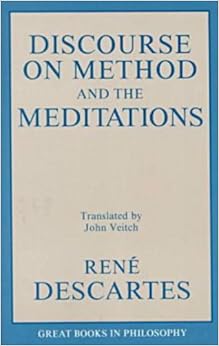
Needless to say, the existence of the thinker necessarily precedes the act of thinking. It goes to show that if, for example, I am doubting, then I must be thinking.

How is it possible?įor Descartes, the fact that he is doubting shows the certainty of the existence of a being that doubts. The methodic doubt, therefore, necessarily leads to the discovery of truth. For example, in the first meditation, Descartes employs again the concept of “methodic doubt” that he first introduced in the Discourse.Īs is well known, the methodic doubt seeks to doubt everything believed to be true in order to determine which beliefs one could be certain as true. In the first meditation, Descartes reiterates materials from his previous work titled the Discourse on the Method. Meditations on First Philosophy (Meditation I): On What Can Be Called into Doubt In what follows, I will briefly sketch the key concepts of each part. Just as the Discourse on the Method, which is Descartes’ first published work, the Meditations on First Philosophy is also composed of 6 parts. As is well known, the Index Librorum Prohibitorum is a list of books that were once forbidden by the Roman Catholic Church because these books were considered as dangerous to the Catholic faith and morals of the Catholic Church. As is well known, Descartes allied himself with the basic outlook of Galileo, especially on the argument that the sun is the center of the universe (heliocentrism) instead of the earth (geocentrism).īecause the Faculty of Theology at the University of Paris had been so influential for centuries, Descartes seemed to believe that if he could secure the approval of the Faculty of Theory at the University of Paris, then he may be able to escape Galileo’s fate.Īs we can see, the Meditations on First Philosophy gained approval from the Faculty of Theology at the University of Paris however, after 22 years, the Roman Catholic Church placed it on the Index Librorum Prohibitorum (Index of Forbidden Books). As we may already know, it had been just 8 years since the condemnation of Galileo.

Descartes’ intention of doing this is obvious. The Meditations on First Philosophy or, simply, the Meditations, is prefaced by a letter to the wisest and most distinguished men, the dean and doctors of the Faculty of Theology of the then University of Paris. Though it is usually known as the Meditations, the full title of the work is Meditations on First Philosophy in which the Existence of God and the Distinction of the Soul from the Body are Demonstrated. The Meditations on First Philosophy is Descartes’ most famous work.


 0 kommentar(er)
0 kommentar(er)
